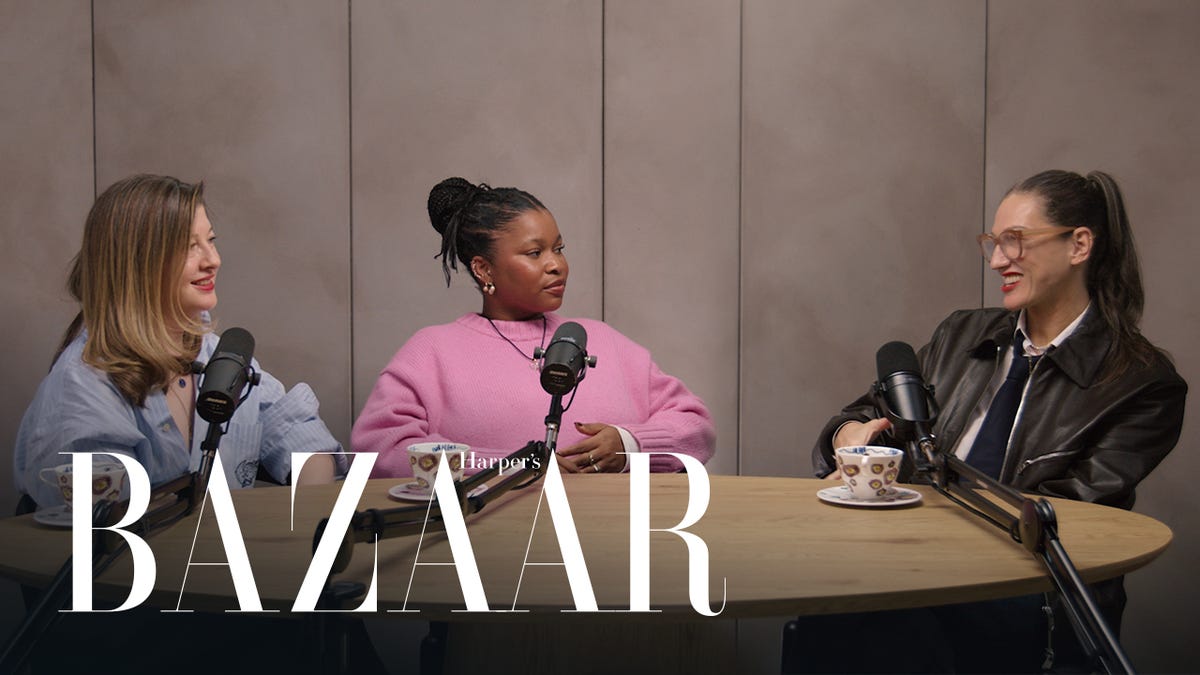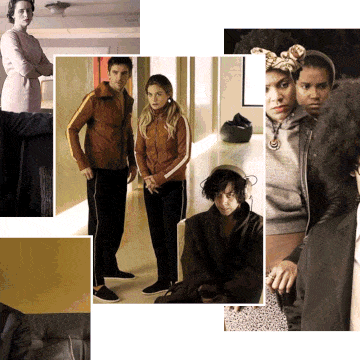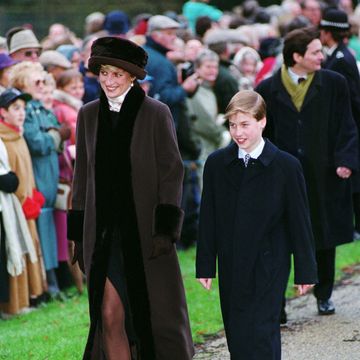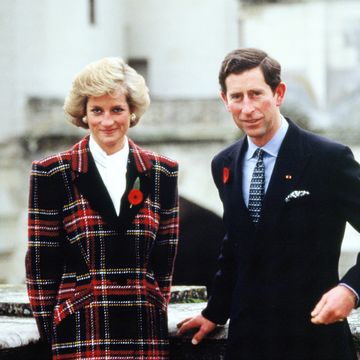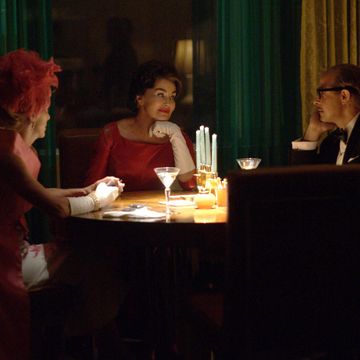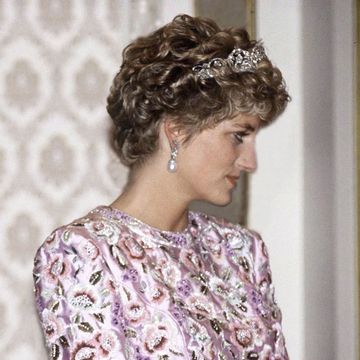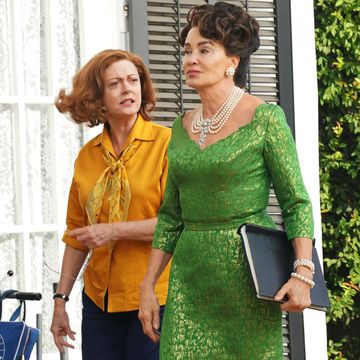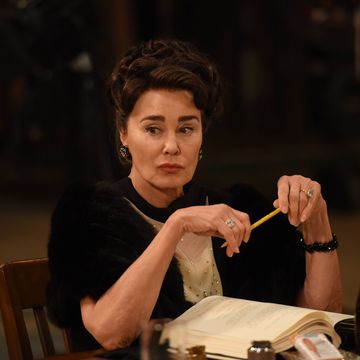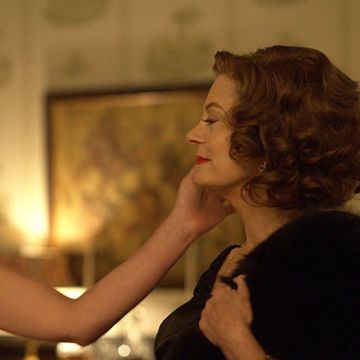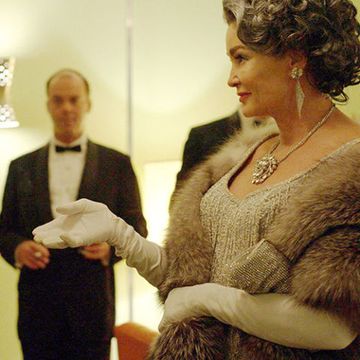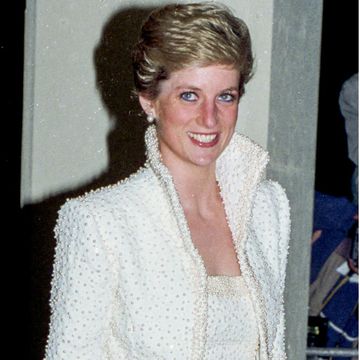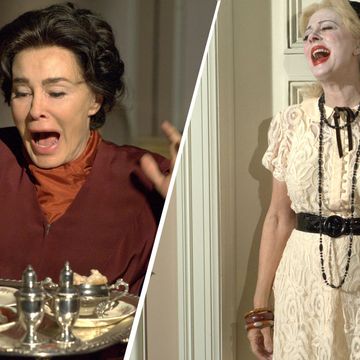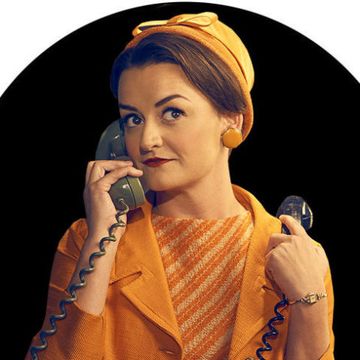The second episode of Feud: Bette and Joan saw our leading ladies' uneasy truce beginning to break down on the set of What Ever Happened to Baby Jane?, thanks largely to the manipulations of Jack Warner (Stanley Tucci). Here are the nine standout moments from the season's second episode, "The Other Woman."
1) The neighbor girl seals her own fate.
"It's for my mother—she's loved you since she was a kid." Oof, girl, this was the wrong thing to say on at least two levels. It's the since she was a kid part that really seals it, emphasizing that Joan is not one but two generations away from her. I'm pretty sure the actress meant well and wasn't deliberately throwing shade, but she was doomed from this moment on.
2) "I think what you're doing with this part is incredibly brave."
The format of my weekly recap really should just be "9 Outstanding Moments of Shade from This Week's Episode." Joan subtly needling Bette about her larger-than-life performance choices as Baby Jane doesn't seem significant in the moment, but as the episode goes on it becomes clear that Bette's a lot more insecure in the role than she's letting on.
3) Bette and Joan gang up on Aldrich.
This was so short-lived and so enjoyable. When Joan went to Bette with her concerns about the pretty young blonde who'd been cast as the neighbor girl, trying to influence her with paranoia that the ingenue will charm Aldrich and end up overshadowing them, I wasn't expecting Bette to take the bait. But Bette agrees, and tells Aldrich he's "casting with the wrong head," finally piling on enough pressure to get the actress fired.
Later in the episode, Joan and Bette are also united in the opinion that Aldrich's script is too on-the-nose, and "doesn't begin to capture how women get under each other's skin." The meta is writ large here, especially since Feud is written predominantly by men, and it remains to be seen whether that criticism will end up feeling a little close to the bone.
4) Joan calls BS on her own movie.
In another expositional aside using the to-camera interview format, Joan Blondell (Kathy Bates) gives us some backstory on Joan's time at MGM prior to joining Warner Bros. That phase of her career ended with the 1943 spy movie Above Suspicion, the plot of which she appears to be struggling with in a flashback. "We're recruited by the British Secret Service to stop the Nazis," she complains, in the middle of a scene with her co-star Fred MacMurray. "Does this make sense to anyone?"
As the montage goes on, we see Warner bringing in Joan as a means of diminishing Bette, who was "difficult, expensive and far too powerful, especially for a woman." Joan was ready and willing to take all the roles Bette shunned, and with Mildred Pierce she wound up getting an Oscar for taking Bette's scraps.
5) Jack Warner sets the feud in motion.
Reports in the real world vary wildly as to how much of Joan and Bette's feud arose naturally and how much was a publicity stunt. For the purposes of Feud: Bette and Joan, what pre-existing tension there was between Bette and Joan would probably have faded entirely, if it weren't for Jack Warner's meddling. Aldrich is thrilled when Warner announces he plans to give Baby Jane a wide release, largely on the strength of its lead actresses' "fuckin' electric" chemistry on screen.
But there are big strings attached—Warner will only give the picture such a wide rollout on the condition that Aldrich drum up a headline-grabbing war between his leading ladies, and keep them at each other's throats long enough to ensure ongoing publicity. "Nobody wants to read about these two battle-axes making nice with each other," Warner warns. And so, with a little help from Hedda Hopper, the back-and-forth tabloid swipes begin, with Bette mocking Joan's fake boobs, and Joan mocking Bette for looking "old enough to be her mother."
6) The Battle of Waterloo analogy.
Just in case you were in any doubt that a) shit's about to get real, and b) Warner is dramatic AF. "Wellington wasn't such a great general until he had to go up against Napoleon," he reasons, explaining to Aldrich why the competition will bring out the best in both Bette and Joan. "Jack… that was war," Aldrich says nervously, to which Warner responds: "So is this!"
7) Joan "recasts" Peter.
He has a name! Joan's mysterious boyfriend from last week turns out to be a doctor named Peter, and from my cursory research does not appear to be a real person. Peter seemingly leaves Joan in this episode, and when he changes his mind she is savage, telling him "I think it's time to recast you. Your lines are stale, your delivery is predictable."
Moments before, Joan bitterly accuses Aldrich of sleeping with Bette, and tries to seduce him herself in a bid to wrest back control of the movie. "This is exactly what happened on Autumn Leaves," he complains. "You saw me having coffee with [Crawford's co-star] Cliff Robertson, the next thing I know your hand's down my pants." He turns down Joan's advances this time, insisting he's trying to keep his marriage together… although as we'll see by the end of the episode, he's not trying that hard.
8) Bette and B. D.'s brutal fight.
Some of the cruelest things ever said in human history have been said by teenage girls in fights with their mothers. After Bette catches B. D. flirting with the crew guys on set and threatens to send her away for the rest of the summer, B. D. snaps and accuses her mom of being a has-been who doesn't know how to let go. "You're jealous because men don't look at you any more and they look at me," she hisses. "No-one wants you any more, nobody's watching you any more."
Unbeknownst to B. D., she's kicking her mother while she's down. Already feeling insecure in her performance, Bette's confidence is further shaken by the arrival of her co-star, Victor Buono, who is… not what she was expecting. She was expecting somebody… "Thinner? Less homosexual?" he prompts, cheerfully.
9) Bette and Aldrich's "rehearsal."
So… as it turns out, Joan wasn't wrong about Aldrich sleeping with Bette. She was just pre-emptive. And her euphemistic reference to "private rehearsals" with Aldrich during Autumn Leaves ends up being prophetic too, because Aldrich helping Bette rehearse Baby Jane's musical number is where the spark between them first emerges. Side note: the word "daddy" sure was used in a sexual context a lot of times this week, and I am less than okay with it.
Setting aside the heebie-jeebies, the significance of "I've Written A Letter To Daddy: is complicated. Unlike Baby Jane, Bette wasn't a child star—Joan is the one who started acting earlier in life—but the "pathos and loss" Aldrich describes in the song is clearly something real Bette's tapping into. The feeling of wanting to go back in time and be adored by audiences again clearly resonates with both actresses in different ways.


